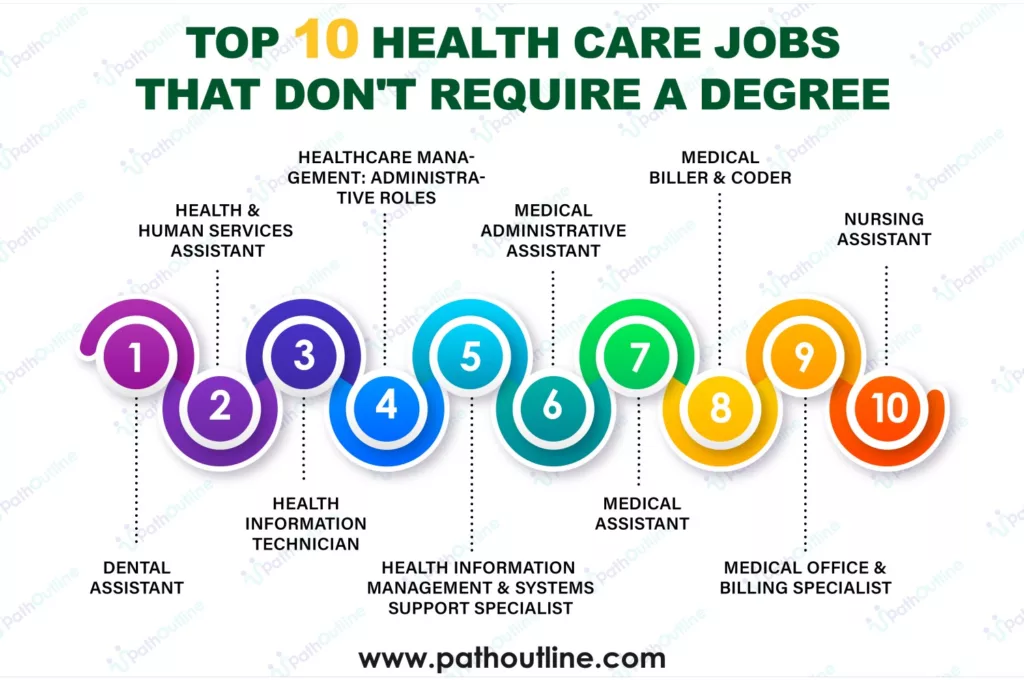With the healthcare industry continuing to grow, more job seekers and career changers are being attracted to different healthcare careers. According to recent research findings by U.S Bureau of Labor Statistics (BLS), the healthcare sector is projected to add the most number of jobs between 2020 and 2030 together with the social assistance department.
Pursuing a career in the healthcare sector is an excellent option for anyone who wants to make a difference in other people’s lives while earning a good salary together with several other benefits. However, whenever anyone thinks about working in the healthcare industry, they always think they will need a degree. The truth is, there are several healthcare careers that do not require any college degree type. Instead, a GED, high school diploma or a certification will be enough.
This article covers the top healthcare jobs that do not require a degree.
10 Health Care Jobs That Don’t Require a Degree
Here are the top 10 medical jobs that don’t require a degree.
1. Dental Assistant

Just as its name implies, dental assistants are responsible for helping dentists together with their staff handle different types of tasks.
They help prepare patients for treatment, taking dental x-rays, help dentists when performing different dental procedures and educate patients on preventive measures for gum and tooth care.
However, there are dental assistants who serve in administrative roles. They can help in office management, record keeping, insurance processing, scheduling appointments and billing.
If you want to pursue a career as a dental assistant, you will have to register for a dentist assistant training program. Here you will be trained on offering both administrative and chair-side roles.
2. Health and Human Services Assistant

Health and human services assistants are responsible for offering advocacy and support for patients and clients like advising them on processes and policies and assisting them secure different community resources. They can also help with offering referrals to social and healthcare service programs. In most cases, health and human services assistants work for non-profit organizations, social service agencies, state or local governments.
It is possible to get a start as a health and human services assistant with a high school diploma or by undergoing on job training.
3. Health Information Technician

Health Information Technician is responsible for securing patient data and ensuring they are accurate and stored in a secure place. You will require both information and technical management skills to land a job as a Health Information Technician since you work will entail entering, retrieving and analyzing of data both in physical and electrical form. You should have knowledge and expertise on how to code diagnoses, treatments and procedures for insurance reimbursements and billing.
To pursue a career as a Health Information Technician, you will require a post-secondary education since you will need to know relevant medical terminologies and codes.
4. Healthcare Management: Administrative Roles

While most of the management careers in the healthcare industry will have require bachelor’s degrees, having an associate degree in healthcare management is capable of earning individuals entry level administrative positions. Some of the common entry level administrative positions including healthcare records clerk, medical billing specialist, and health information technician.
If hired for any of these roles and you decides to further your education and gain relevant work experience, you can be eligible for the post of a front desk supervisor, medical office supervisor, medical billing supervisor or any similar healthcare field jobs.
5. Health Information Management and Systems Support Specialist

Are you intrigued about computers and intend to pursue a career in healthcare but lack a degree? No need to worry, you can combine your two interest and land a job as a health information management specialist. You will be responsible for managing healthcare records, offering desk support and troubleshooting different healthcare software.
Despite most healthcare employers preferring computer support specialists with a degree, it is still possible to venture into this profession without a university degree. However, you will need to prove you are an expert when it comes to software management.
6. Medical Administrative Assistant

Despite BLS reports on the decline in the administrative assistant positions across different industries, healthcare administrative jobs are always on the rise. As a medical administrative assistant, you will need to have computer skills and excellent knowledge of office systems and types of equipment. With this position, you can advance and be familiar with procedure codes, medical diagnosis, medical transcription and health records management.
You will have to undergo training in medical terminology together with industry specific practices. Having an associate degree or a diploma will offer you the necessary academic background.
7. Medical Assistant

Although several healthcare careers focus on either medical assistant, clinical or administrative tasks, it is advisable that medical assistants have training in both fields. Their main responsibilities as medical assistants will be collecting patient medical histories, developing and ensuring electronic health records are up to date, measuring vital signs, scheduling appointments, administering medication, running lab tests and drawing blood.
One will require a post-secondary education for this role. Diploma programs are very common while there are schools that offer an associate degree. Although there are regions that do not require any certification, most employers will always opt to hire individuals who have relevant certifications.
8. Medical Biller and Coder

Medical Billers and Coders are tasked with translating medical terminologies into standard industrial codes for every treatment, diagnosis and procedure. Most of these codes are used during submission of healthcare claims to insurers. It means coders need to understand the process of billing and requirements for insurance.
Both Medical Billers and Coders belong to the BLS category of medical secretaries. To land a job as a medical biller or coder, you will have to undergo a formal training in any common industry coding system together with having some familiarity with billing and processing applications.
9. Medical Office and Billing Specialist

These specialists generally perform administrative work and/or serve in an accounts receivable role in a healthcare setting. Their tasks might range from scheduling appointments and organizing filing systems to processing healthcare claims and preparing financial reports.
Workers in this field typically need knowledge of billing regulations as well as the standard industry codes required for claims processing and reimbursement. One will require relevant training like undergoing a one year vocational school program or having an associate degree. You can also pursue Certified Billing and Coding Specialist (CBCS) and certified Billing designation to help you stand out from other applicants.
10. Nursing Assistant

Nursing assistants are responsible for supporting physicians and nurses in offering patient care in different settings like home healthcare agencies, nursing homes and hospitals. The nursing assistants will be tasked with measuring vital signs such as blood pressure and temperature, helping patients in day to day activities like dressing, bathing, eating, and recording patient’s health. They will be offering care giver services to patients ensuring they are comfortable and compassionate.
It is an excellent healthcare career to individuals looking for jobs that do not require years of training. However, any nursing assistant will have to complete a state approved education program and a competency examination.
Conclusion
You can train in most of the above health career careers in a year or two depending on how fast you can learn. In certain cases, you can complete classroom instructions together with an externship in 2 to 3 months.


